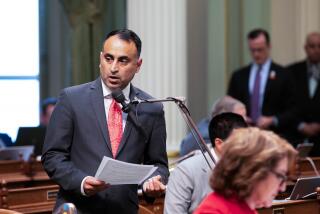Home Health Care Costs Threaten Medicare Bill, Rostenkowski Says
- Share via
WASHINGTON — House Ways and Means Committee Chairman Dan Rostenkowski (D-Ill.) warned Wednesday that mounting pressure to include payments for long-term home health care in legislation expanding Medicare coverage could doom the entire bill by raising concerns about its cost.
The congressman said he and many of his colleagues fear that a proposed increase in Medicare payroll taxes designed to pay for such long-term care could push the cost of the overall bill to $6 billion a year. The proposed additional money would pay for the services of homemaker aides and other non-medical personnel to care for persons who cannot otherwise manage independently at home.
Rostenkowski is chairman of the House-Senate conference committee that began work Wednesday on legislation to provide the biggest expansion of Medicare since the program began in 1965.
The existing legislation deals with the expenses of short-term acute ailments. As currently written, the measure does not apply to the costs of those who have chronic, long-term problems, whether in nursing homes or in their own homes.
Fears Rancorous Debate
The congressional Democratic leadership, Rostenkowski said, is becoming worried that “we can lose catastrophic care . . . (because of) long-term care” legislation. The debate over costs of the long-term care plan could become so rancorous that it could imperil passage of the catastrophic care bill, he told a breakfast meeting with reporters.
Under a measure promoted by Rep. Claude Pepper (D-Fla.), the best-known congressional advocate of the elderly’s interests, the new long-term care benefit would be available to millions of Americans.
Eligible would be those unable to perform two or more of the activities of daily living: dressing, bathing, eating, getting in and out of bed, and using the toilet. A family could use the money to pay for someone to come into the home and help the patient.
Lifts Limit on Payroll Tax
The Pepper proposal would raise money for the benefit by lifting the limit on the Medicare payroll tax, which is now 1.45% of salaries and wages up to $45,000. All payroll income would be subject to the 1.45% tax. About 5% of workers make over $45,000 a year, and they would be financing the new benefit.
“This frightens me,” Rostenkowski said, adding that the proposal could cause costs to spiral out of control.
The Medicare legislation being considered by Rostenkowski’s conference committee would be largely financed by the beneficiaries themselves, through a premium linked to income. The financial burden would be borne by the 40% of Americans over 65 with income levels high enough to require them to pay federal taxes.
More to Read
Get the L.A. Times Politics newsletter
Deeply reported insights into legislation, politics and policy from Sacramento, Washington and beyond. In your inbox twice per week.
You may occasionally receive promotional content from the Los Angeles Times.









